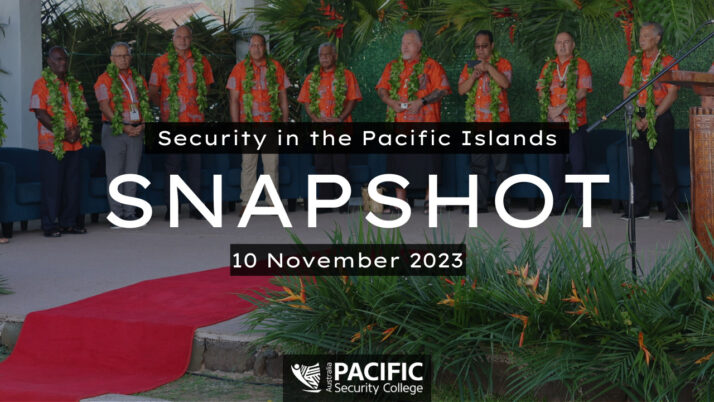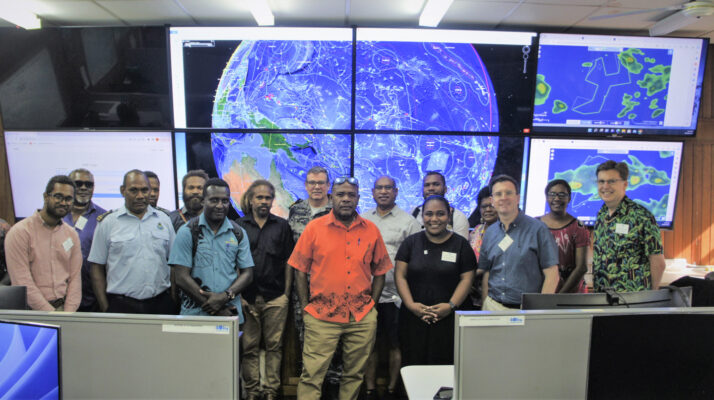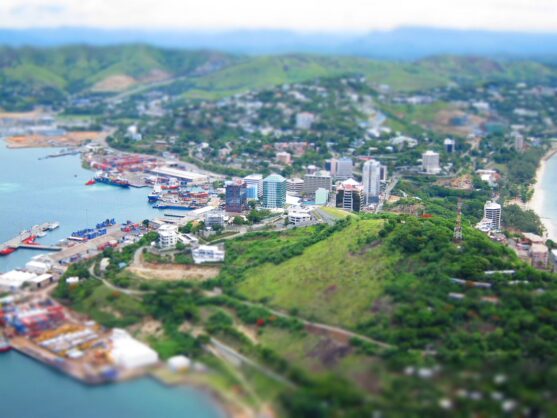PNG’s power plays and political sideshows
Henry Ivarature
Papua New Guinea Prime Minister James Marape is looking to hold onto leadership by the skin of his teeth, but he cannot afford to be distracted from the major challenges facing his country, Henry Ivarature writes.
Papua New Guinea (PNG) politics is not a game for the faint-hearted.
On 14 December 2020, the parliamentary Speaker Job Pomat hijacked proceedings and forced an adjournment to 16 December for the court to determine the status of an opposition member of parliament (MP). This helped to prolong Prime Minister Marape’s hold on power and broke the opposition’s spirit in its campaign to wrestle power from him.
Upon returning to hear the outcome of the court’s decision, parliament witnessed several opposition MPs, led by John Pundari and Sam Basil, cross the floor and re-join the government. On 13 November, Basil, Pundari, and several ministers and MPs had crossed the floor to join the opposition, but Marape gratefully welcomed them back.
The events that unfolded in parliament were reminiscent of the nursery rhyme, Little Bo-Peep. Marape had lost some of his sheep. He knows where to find them. He left them alone, and after a month they came home wagging their tails behind them.
With the government’s numbers in parliament re-enforced by the returning MPs, Treasurer Ian Ling-Stuckey re-tabled the 2021 national budget and passed it without debate. Most opposition MPs had exited the chamber, realising that their hopes of forming a new government had dissipated.
Government once again replaced opposition MPs with theirs on the parliament committee dealing with no-confidence motions, and adjourned parliament for five months to 20 April 2021. This meant that Opposition Leader Belden Namah’s efforts to oust Marape were derailed once again, at least for now.
The role played by Pomat as speaker was central to Marape averting a no-confidence vote and Namah wants him held responsible. He filed a Supreme Court case under Section 23 (Sanctions) to have Pomat prosecuted for ‘knowingly and deliberately breaching the constitution’.
Namah seized on the court’s judgement, where it raised questions about the speaker potentially breaching the constitution by overturning the ruling of the deputy speaker, overlooking the standing orders on the motion of no-confidence served on Pomat by the opposition, and allowing the government to pass the budget without debate. He pointed to the court’s warning of serious consequences for mal-administering parliament.
Namah’s action is the first undertaking of its kind against a speaker in PNG. With recent cases of questionable and partisan conduct by several speakers, Namah’s response was necessary to protect the constitution, restore the integrity of parliament, and the standing of the speaker, the constitution and the country’s democracy.
But this is the least of Marape’s worries. His challenge is to keep his coalition and cabinet intact. Marape held off announcing a full cabinet reshuffle after 12 ministers defected, probably hoping he could bring them back into the fold.
William Duma and Justin Tkachenko were the first to return, followed by Wesley Rumimai. A caretaker cabinet of nine ministers held the fort during the political impasse. To prevent further defections, when the MPs returned and some were sworn in as ministers, Marape held off naming their portfolios until 20 December.
Marape’s new coalition cabinet is dominated by his Pangu Pati, which has 12 ministers out of 32. The second largest party is Duma’s United Resources Party (URP) with five ministers, followed by National Alliance (NA) with three. Liberal, United Labour, PNG National, and People’s parties each have two ministers. The remaining four ministries were awarded to four single-member parties.
Despite the Duma’s URP being the second-largest coalition partner, Marape reinstated United Labour’s Basil as Deputy Prime Minister. Currently, the only thing that’s known for sure is that the political numbers game will continue.
Marape acknowledged that his ministerial allocations were a “balancing act to restore power and confidence, and… govern”. It was also a choice between rewarding loyal MPs and rewarding defectors to keep the numbers.
Marape’s cabinet comprises three distinct groups. A quarter are new ministers. Except for Pundari, who defected and returned, all the so-called ‘next generation’ leaders lack ministerial experience. Clearly, they have been rewarded for their loyalty.
Fifteen MPs, including three defectors – Tkachenko, Westly Nukundj, and Basil – retained their portfolios. Besides the deputy prime minister post, Basil assumed the commerce and industry portfolio, taking over from Duma. His former role of national planning, where he was accused of misappropriating district services improvement program funds, went to the very MP who accused him, Rainbo Paito.
The final group of seven ministers were reshuffled from one portfolio to another. Two MPs, Soroi Eoe and Jelta Wong, were appointed to their former portfolios of foreign affairs and health, respectively, while Duma was appointed to the state enterprises portfolio.
Marape now has to appease four ministers that defected on 13 November and returned to join government on 16 December. This group, which has not been considered for ministerial appointments, includes Nick Kuman, Sasindran Muthuvel, Chris Nangoi, and Joe Yopyyopy. Kuman and Sasindran belong to Marape’s Pangu Pati. Nangoi is with the United Labour Party and Yopyyopy is from Melanesian Alliance.
With many defectors back in government, having the numbers cannot guarantee the stability of his flock, or political power. But he must do everything to keep them happy if he wants to retain the leader’s seat.
What this means for the PNG people in the middle of the COVID-19 pandemic is less clear. While the political numbers game will likely continue, any distractions from handling the pandemic – not to mention the myriad other challenges facing the country – could have a devastating impact on his people.
More Stories

Security Snapshot - 10 Nov 2023
Pacific Security Snapshot | 10 November 2023
The security stories shaping the region 52nd Pacific Islands Forum Leaders’ Meeting in Cook Islands The South Pacific Connect Initiative Australia-United States commitments to Pacific finance and infrastructure Lowy Institute 2023 Pacific Aid Map Tropical Cyclone Lola hits Vanuatu and Solomon Islands Parties to the Nauru Agreement endorse the Kirimati Communique Tonga prepares for El…

Latest News - 4 Oct 2023
Regional and National Security Architecture in the Blue Pacific, Honiara, Solomon Islands
Former deputy secretary of the Pacific Islands Forum Mr Peter Forau, and CEO of Solomon Islands Broadcasting Corporation and former adviser to the Pacific Islands Forum Johnson Honimae join the Pacific Security College’s workshop on Regional and National Security Architecture in the Blue Pacific The recently concluded Regional and National Security Architecture in the…







